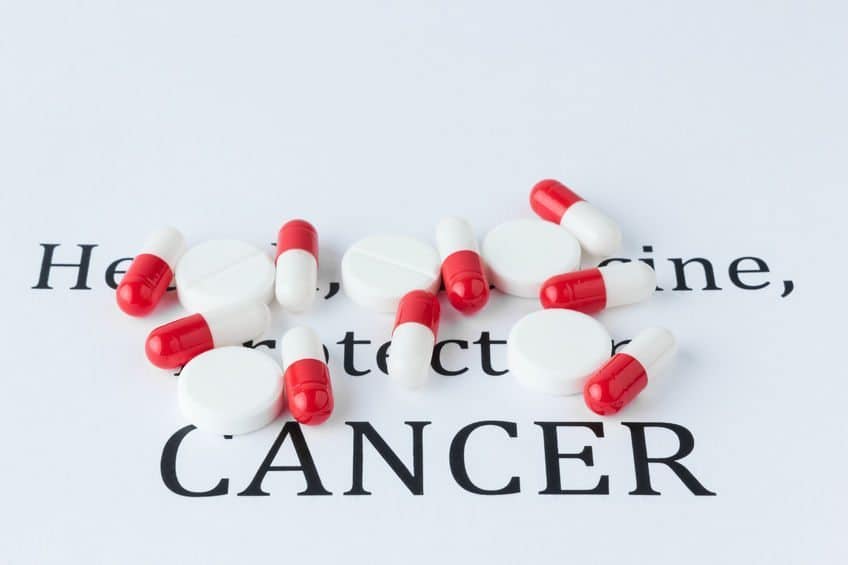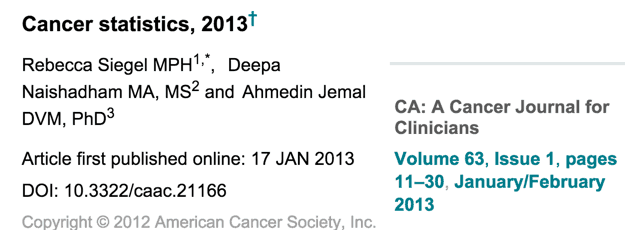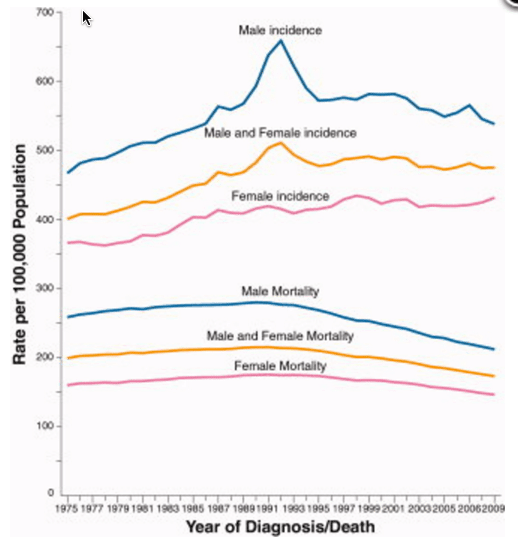
Unfortunately, the treatment of cancer in the Western world is nothing but a scandal.
The real causes of the disease are not treated, and instead, the drug is treated with a poison/cut/burn strategy, so that if a person eventually succumbs to cancer, it is recorded on the death certificate with a cause other than cancer.
So the more they get treated, the sicker they get with toxic chemotherapy and toxic radiation.
And then eventually, if cancer comes back, and they’re treated again, they die from complications of all this treatment. Often they don’t die from cancer.
So let me show you what I mean. Here are the latest cancer statistics I could find, from 2013. This is published by the American Cancer Society.
 They show the following chart which shows you the incidence of diagnosis, and also, in the lower three lines shows you the mortality rate gently falling. You could see that the mortality rate for women has been almost flat, and for men is just slightly down, and if you look at the numbers cancer deaths are just modestly down since about 1991.
They show the following chart which shows you the incidence of diagnosis, and also, in the lower three lines shows you the mortality rate gently falling. You could see that the mortality rate for women has been almost flat, and for men is just slightly down, and if you look at the numbers cancer deaths are just modestly down since about 1991.
So in 1991, there was a big spike in cancer diagnosis, and then for some reason the diagnosis of cancer rapidly fell, and the mortality rate of cancer started to fall.
You notice anything suspicious?

Let’s take a look at how deaths are attributed to cancer and why it matters
 Notice that one of the authors is Dr.Colin Begg.
Notice that one of the authors is Dr.Colin Begg.
As they say, at the Sloan-Kettering Institute, where Dr. Begg heads up statistics, “The Department of Epidemiology and Bio statistics is engaged in a broad program of research encompassing bio statistics methodology, health outcomes research, and research into genetic and environmental risk factors for cancer.”
Hardly a slouch so let’s hear from Dr. Begg.
 So the first clue is how the causes of death (say from cancer) are subject to change.
So the first clue is how the causes of death (say from cancer) are subject to change.
“The classification rules are changed periodically; most recently in 1999.”
So what are you saying? EVERYTHING.
Cancer death rates are systematically underestimated, in that many patients who die as a result of cancer treatment do not have cancer recorded as the underlying cause of
death.…for 41% of these deaths, the cause was not attributed to cancer. The authors speculate that cancer treatment is the probable underlying cause for essentially all of these
deaths and, as a result, the cancer mortality rate is underestimated
This is the conclusions of the study that Dr. Begg is discussing. Cancer mortality rates are underestimated.
Now look again at that chart. See the modest reduction in deaths. See the dramatic peak and fall in cancer diagnosis.
You can bet that this was all a result of under reporting. Significant and severe under recording and under reporting of cancer diagnosis, and the cause of death when people die from chemotherapy complications, from radiation complications, from a radioactive seed that wanders and kills the man, from a dangerous breast cancer drug that causes more cancer in the woman, etc., etc., etc.
There are many types of cancer. When people hear cancer, they want to slash, cut, burn, poison. But the results do not indicate any improvement in lifespan or reduction in mortality rates for cancer.
There may be a few types of cancer where this is not so. But for the vast majority of cancer, treating it the way we do it today has no benefit.
I hate to say this, but the reality is that there is no evidence for any fall in cancer death rates, as a result of modern treatments. It’s all in the chart.
Think about it.
Citations
Cancer statistics, 2013
http://onlinelibrary.wiley.com/doi/10.3322/caac.21166/full
Attribution of Deaths Following Cancer Treatment
http://jnci.oxfordjournals.org/content/94/14/1044.full.pdf
Click for more information on Cancer Treatment, for information on Medicine, or for more on Cancer.
